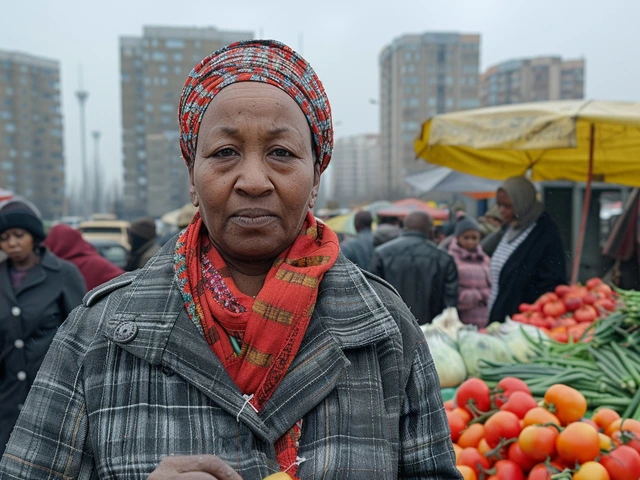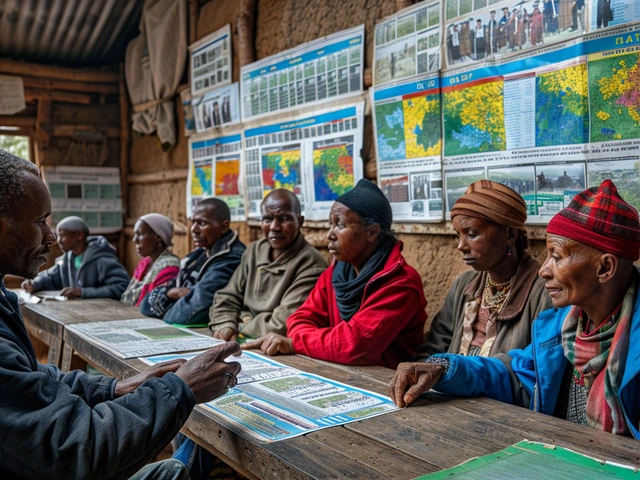Housing Types and Rent Ranges in Ethiopia
Living in Ethiopia, I've come to discover the fascinating diversity not just in its culture and landscapes but also in its housing markets. Whether you're eyeing a modern apartment in the heart of Addis Ababa or a traditional villa in the more serene locales like Hawassa, the options are as varied as the country's terrain. But what's on everyone's mind is how much these living quarters translate to in US dollars.
Rents here can vary dramatically based on location, housing type, and amenities provided. For example, a modest one-bedroom apartment in the city center might cost anywhere from 300 to 600 USD per month, while the same in a more suburban area could lower your cost to 150 to 300 USD. If you're looking towards more luxurious living spaces or villas, prices can escalate quickly into the thousands, especially in upscale neighborhoods or newer developments.
But it's not just the variety that's intriguing; it's how these prices are affected by local conditions and the economy. A lot depends on the exchange rate between the Ethiopian Birr and the US Dollar, which sees its fair share of fluctuations. This instability can sometimes work in your favor or against you, affecting your rent and overall cost of living. Keeping an eye on this exchange rate is crucial for anyone planning to live here and manage expenses efficiently.
Villas and Traditional Houses
Among the unique offerings in the Ethiopian housing market are the villas and traditional houses, particularly prevalent in regions outside of Addis Ababa. These can offer more space and a deeper connection to local culture. Rent for such homes typically starts around 400 USD but can go up significantly based on location, size, and the inclusion of modern amenities. It's a world apart from the high-rise apartments of the city, offering a more laid-back lifestyle.
Understanding Rent Prices: The Conversion to US Dollars
The primary concern for many expatriates and foreigners living in Ethiopia is understanding how rent prices translate into US dollars. This conversion is paramount, considering the majority of expatriates operate with finances in USD. Given the ebb and flow of the Ethiopian Birr in the global market, rent prices can seem like a moving target. However, with some local knowledge and financial savvy, navigating this landscape becomes much more manageable.
Key to this understanding is getting acquainted with the average exchange rate, which currently stands at about 1 USD to 50 Ethiopian Birr. This rate does witness shifts, and staying updated can significantly influence your housing budgeting. It's also wise to consider the payment terms; some landlords may prefer or even insist on payments in USD to protect their income from currency fluctuations. This arrangement can sometimes work to your advantage if negotiated well.
When considering rent in Ethiopia, it's also essential to look beyond the surface numbers. The cost of living here entails more than just your monthly rent. Utilities, which might not always be included in your rent, internet, and even the cost of furnishings (if you're moving into an unfurnished space) can add up. It's not just about finding a place to live; it's about making it a home without breaking the bank, which requires thoughtful consideration and planning.
"Ethiopia's rental market offers a variety of choices for every budget, but understanding the true cost requires a deeper look into local market dynamics."
Lastly, negotiation is key. Unlike in some Western countries where rent prices can be non-negotiable, here, there's often room to discuss terms, especially if you're committing for a longer term. Coming armed with knowledge about the local market and average prices can empower you to secure a better deal, making your transition to life in Ethiopia not just smoother but more enjoyable and financially sustainable.

 Dentist Salary in Ethiopia: Earnings, Insights, and Opportunities
Dentist Salary in Ethiopia: Earnings, Insights, and Opportunities
 Average Monthly Income in Ethiopia: A Detailed Analysis
Average Monthly Income in Ethiopia: A Detailed Analysis
 Exploring the 9 Core Areas of Occupation: A Comprehensive Guide
Exploring the 9 Core Areas of Occupation: A Comprehensive Guide
 Understanding the Average Salary in Ethiopia: An In-depth Analysis
Understanding the Average Salary in Ethiopia: An In-depth Analysis
 Bringing Cash into Ethiopia: Limits and Tips for Travelers
Bringing Cash into Ethiopia: Limits and Tips for Travelers
Reagan Traphagen
April 4, 2024 AT 01:51Don't be fooled, the rent numbers are a government ploy to keep expats in check.
mark sweeney
April 4, 2024 AT 02:20So you think the whole housing market is just a big experiment? i guess the truth is way more boring – most landlords just want the cash, not some grand conspiracy. still, i’d say keep an eye on the birr, it moves like a jittery hamster.
randy mcgrath
April 4, 2024 AT 03:43I've been looking at the rental figures for Ethiopia for a while now.
What strikes me is the sheer range of options, from cramped city flats to spacious countryside villas.
The conversion to US dollars adds a layer of complexity that many newcomers underestimate.
In my experience, the exchange rate can swing by several birr in a matter of weeks, which directly impacts budgeting.
Those planning to stay longer should definitely consider locking in a fixed rate or negotiating rent in dollars.
Utilities, especially electricity and internet, often aren't bundled, so you should factor those costs separately.
I've found that many landlords are open to negotiations if you demonstrate a stable income and a willingness to commit.
It's also wise to ask about maintenance responsibilities, as they can vary wildly from one building to another.
While the city center can be pricey, suburbs offer decent comfort for a fraction of the cost, which is something I always recommend.
For those who value cultural immersion, a traditional house can provide a richer experience, but be prepared for possible trade‑offs in modern amenities.
The key takeaway is to never accept the first figure you hear – do your own research and compare listings.
Moreover, keep a spreadsheet of monthly expenses to see the real picture beyond just rent.
If you can, pay in dollars; it shields you from the birr’s volatility, but always double‑check the conversion rate on the day you transfer.
Finally, remember that relationships matter – a friendly rapport with your landlord can smooth over many hassles.
In short, approach the market with curiosity, caution, and a budget that accounts for the unknowns.
Frankie Mobley
April 4, 2024 AT 04:33Rent can seem high, but you can often negotiate the price or ask the landlord to accept USD directly, which helps avoid the birr’s ups and downs.
ashli john
April 4, 2024 AT 05:40That overview really helps i appreciate the practical tips you shared it makes planning a lot easier
Kim Chase
April 4, 2024 AT 06:46yeah i think you’re right about the negotiable part many owners are chill about it, just talk it out and you’ll get a better deal